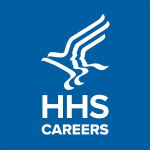
HHS Careers
Come to work at HHS and be Part of Something Bigger

The Mission of HHS
The mission of the U.S. Department of Health and Human Services (HHS) is to enhance the health and well-being of all Americans, by providing for effective health and human services and by fostering sound, sustained advances in the sciences underlying medicine, public health, and social services.
To learn more about HHS and fulfilling the mission, visit About HHS.
Upcoming Career Events
May 29, 2024
Western Oregon University 2024 Spring Term Federal Agencies ProChat
May 29 (6pm–8pm ET)
Monmouth, OR
West Oregon University students – meet with HHS staff to learn about agency opportunities!
What agency do you want to work for?
HHS is composed of a central office in Washington, DC, and 11 supporting agencies. HHS employs more than 80,000 federal employees across the United States and around the world. There are 10 regional offices ensuring HHS maintains close contact with state, local, and tribal partners and addresses the needs of communities and individuals served through HHS programs and policies.
The agencies and offices cover specific areas in the field but there is also a lot of overlap. Knowing the mission and programs for each division can help you narrow down your job choices. HHS.gov provides a complete list of all of the agencies and offices.
